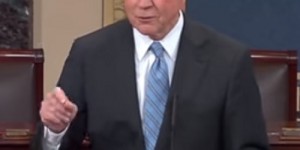Newsmax — The U.S. House voted to block President Barack Obama’s immigration orders in a symbolic move meant to clear the way for action next week to fund the U.S. government and avoid a shutdown.
The 219-197 vote today allowed Republicans to vent their frustration over Obama’s decision to ease deportation rules for millions of undocumented immigrants without holding up a spending bill. Some Republicans wanted to attach the immigration language to a government spending measure, which would have led to a standoff with Democrats.
“The American people were crystal clear about their dislike” of Obama’s action on immigration, third-ranking House Republican Steve Scalise of Louisiana said during today’s floor debate. “This legislation says ‘you can’t do that, Mr. President. There’s a rule of law.’ ”
Current government funding ends Dec. 11. House Appropriations Chairman Hal Rogers, a Kentucky Republican, said today that he and his Senate counterpart, Democrat Barbara Mikulski, plan tomorrow to “sign off on the final deal” to fund most of the government through September 2015.
A previously skeptical Nancy Pelosi, the House Democratic leader, signaled that the funding bill is likely to get her members’ support if Boehner entertains some Democratic demands.
“Let us supply the votes to keep government open but we can’t do that unless we have a bill worthy of our support,” Pelosi of California told reporters today.
Still, many Democrats spoke against the immigration measure today.
“Prior presidents were not met with such obstructionism,” said Representative Zoe Lofgren of California, who has negotiated with Republicans on immigration legislation. “He cannot change the law and he has not done so. He does have the authority to grant temporary relief to some.”
Boehner and his lieutenants in the House devised the two-step strategy to keep the dispute over immigration from causing a repeat of the 16-day partial shutdown in October 2013, which stemmed from a Republican bid to use spending legislation to defund Obamacare.
The Senate doesn’t plan to take up today’s immigration bill, and the Obama administration said the president would veto the measure if it reached his desk.
The second step requires both chambers to pass a separate measure funding almost all of the federal government.
“We think this is the most practical way to fight the president’s actions,” Boehner of Ohio told reporters today.
In a minor concession to some conservatives, House leaders are considering a revision that would move up a fight over immigration funding to soon after Congress reconvenes in January instead of in March.
Democrats want to cut from the spending bill at least 70 Republican-sponsored provisions that would poke holes in Obama’s policies on the environment, health care and other matters, Representative Jim Moran, a Virginia Democrat, said yesterday.
“We are like Amtrak,” Mikulski of Maryland, the Senate appropriations chair, said today. “We’ve left the station, we’re headed to our destination and we will have some stops along the way.”
Under Boehner’s approach, the Department of Homeland Security, with primary responsibility for immigration policy, would be funded only into March 2015.
That would set up a clash over Obama’s immigration orders early next year, when Boehner and incoming Senate Majority Leader Mitch McConnell will face more pressure from the expanded Republican majority to retaliate against Obama’s orders.
Republicans won control of the Senate and increased their House majority in November’s election.
Boehner said the Homeland Security funding strategy lets Republicans keep “our leverage so that when we have reinforcements in the Senate, we’re in the strongest position to take additional action to fight the president’s unilateral action.”
“There are three or four general arrows that are being talked about. Leadership, to their credit, is listening,” said Representative Kevin Brady, a Texas Republican.
Some opponents of Boehner’s approach want funding for immigration-related agencies to expire in January so the new Republican-led Congress can defund parts of the agency tasked with carrying out Obama’s orders. Boehner may agree to move the date to February, according to a Republican aide who sought anonymity to describe the private talks.
Obama said yesterday he was encouraged by statements from Boehner and McConnell about preventing another shutdown, “and I take them at their word.”
“The one thing I can say for certain is that no one benefits by the government shutting down,” the president told members of the Business Roundtable in Washington.
In the Senate, Majority Leader Harry Reid said he would be open to Boehner’s approach if Republican leaders could gather enough House votes to advance it.
Still, some Republicans in Congress favor an immediate fight over Obama’s immigration orders by holding up funding for immigration-related agencies starting next week.
“The entire constitutional structure is at stake,” Senator Jeff Sessions, an Alabama Republican who opposes the funding measure, said today. “I don’t think it’s dawned on people” and “I don’t think we should be timid about it.”
At a news conference yesterday, Senator Ted Cruz of Texas said passing a symbolic bill against the deportation orders would be a “meaningless show vote.”
Cruz, who led the drive for the 2013 shutdown, said Congress should pass a short-term spending bill that blocks Obama’s immigration orders through funding for the Department of Homeland Security and Department of Justice.
Cruz also said the Senate should block confirmations for all non-national security presidential appointments.
Reid said the Senate won’t consider the House immigration bill, H.R. 5759, which would deny the president authority to protect undocumented immigrants in the U.S. from deportation.
Obama announced Nov. 20 that he would temporarily halt deportations for about 5 million undocumented immigrants in the U.S. His directive will defer for three years the deportation of people who came to the U.S. as children as well as parents of children who are citizens or legal permanent residents.
The Department of Homeland Security will streamline the visa process for foreign workers and their employers and give high-skilled workers more flexible work authorization.




























